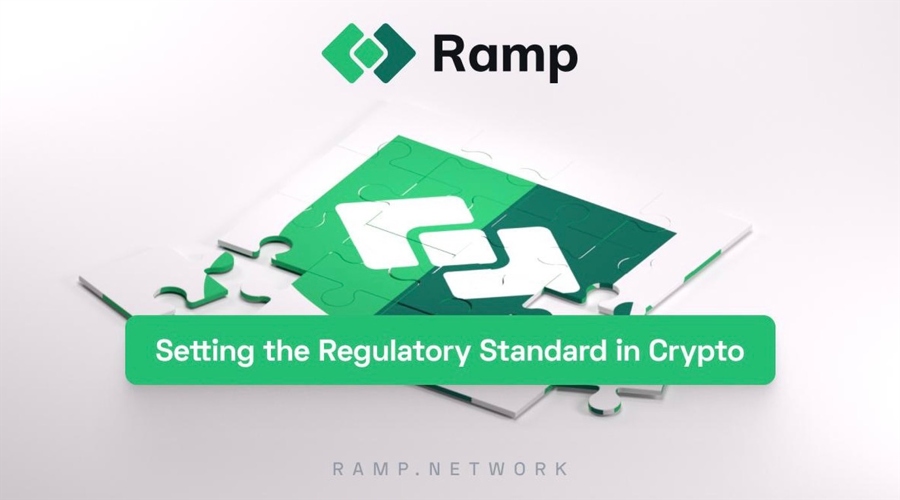Ramp Network, the financial technology company building payment rails connecting crypto to the global financial system, today announced a groundbreaking solution that enables non-custodial wallets to comply with the UK Financial Conduct Authority’s (FCA) regulations and participate in the country’s thriving crypto market.
The UK’s Financial Conduct Authority (FCA) has established a world-leading and rigorous framework for crypto promotions, requiring firms to comply with strict but valuable customer protection rules. This is a challenge for Web3 businesses and non-custodial wallets, which are ineligible for direct FCA authorization. Effectively, there was no way for a non-custodial wallet to provide any other features, like staking, on-ramping or swapping. It was even referred to by some in the industry as a “de-facto ban on wallets in the UK”.
The model means that industry partners can continue to offer services within the UK, in a modified, but compliant manner.
Ramp’s innovative solution bridges this gap, empowering non-custodial wallets to navigate the FCA’s regulations and access the UK market compliantly. Here’s how it works:
· Partnership with a Section 21 Approver: Ramp collaborates with Archax, a regulated third party to handle compliance checks for promotions targeting UK users.
· Streamlined Process for Partners: Non-custodial wallets can leverage Ramp’s pre-approved compliance infrastructure to ensure their UK-targeted promotions meet all the requirements of these FCA regulations.
· Early Traction: This solution is particularly beneficial for non-custodial wallets like Metamask and Trust Wallet, which can use this model to access the UK market.
Benefits for Web3 products:
· Simplified Compliance: Avoid the complexities of navigating the FCA’s regulations alone.
· Faster Market Entry: Quickly and compliantly reach the UK market with Ramp’s solution.
· Focus on Core Business: Focus on developing your wallet and user experience.
Ramp’s innovative model paves the way for non-custodial wallets to participate in the growing UK crypto market while ensuring regulatory compliance and prioritising customer protection.
“This model is entirely new, and demonstrates Ramp’s ambitious, forward-thinking, and compliance-led approach to the ever-changing and challenging face of crypto regulations,” said Steven Eisenhauer, Chief Risk & Compliance Officer at Ramp Network.
Want to learn more? A conversation with Steven Eisenhauer, Chief Risk & Compliance Officer at Ramp Network, with DL Research.
About Ramp
Ramp (https://ramp.network/) is a financial technology company building solutions that connect the crypto economy with today’s global financial infrastructure. Through its core on- and off-ramp products, Ramp provides businesses and individuals across 150+ countries with a streamlined and smooth experience when converting between cryptocurrencies and fiat currencies. Ramp is fully integrated with the world’s major payment methods, including debit and credit cards, bank transfers, Apple Pay, Google Pay, and more.
Ramp Network, the financial technology company building payment rails connecting crypto to the global financial system, today announced a groundbreaking solution that enables non-custodial wallets to comply with the UK Financial Conduct Authority’s (FCA) regulations and participate in the country’s thriving crypto market.
The UK’s Financial Conduct Authority (FCA) has established a world-leading and rigorous framework for crypto promotions, requiring firms to comply with strict but valuable customer protection rules. This is a challenge for Web3 businesses and non-custodial wallets, which are ineligible for direct FCA authorization. Effectively, there was no way for a non-custodial wallet to provide any other features, like staking, on-ramping or swapping. It was even referred to by some in the industry as a “de-facto ban on wallets in the UK”.
The model means that industry partners can continue to offer services within the UK, in a modified, but compliant manner.
Ramp’s innovative solution bridges this gap, empowering non-custodial wallets to navigate the FCA’s regulations and access the UK market compliantly. Here’s how it works:
· Partnership with a Section 21 Approver: Ramp collaborates with Archax, a regulated third party to handle compliance checks for promotions targeting UK users.
· Streamlined Process for Partners: Non-custodial wallets can leverage Ramp’s pre-approved compliance infrastructure to ensure their UK-targeted promotions meet all the requirements of these FCA regulations.
· Early Traction: This solution is particularly beneficial for non-custodial wallets like Metamask and Trust Wallet, which can use this model to access the UK market.
Benefits for Web3 products:
· Simplified Compliance: Avoid the complexities of navigating the FCA’s regulations alone.
· Faster Market Entry: Quickly and compliantly reach the UK market with Ramp’s solution.
· Focus on Core Business: Focus on developing your wallet and user experience.
Ramp’s innovative model paves the way for non-custodial wallets to participate in the growing UK crypto market while ensuring regulatory compliance and prioritising customer protection.
“This model is entirely new, and demonstrates Ramp’s ambitious, forward-thinking, and compliance-led approach to the ever-changing and challenging face of crypto regulations,” said Steven Eisenhauer, Chief Risk & Compliance Officer at Ramp Network.
Want to learn more? A conversation with Steven Eisenhauer, Chief Risk & Compliance Officer at Ramp Network, with DL Research.
About Ramp
Ramp (https://ramp.network/) is a financial technology company building solutions that connect the crypto economy with today’s global financial infrastructure. Through its core on- and off-ramp products, Ramp provides businesses and individuals across 150+ countries with a streamlined and smooth experience when converting between cryptocurrencies and fiat currencies. Ramp is fully integrated with the world’s major payment methods, including debit and credit cards, bank transfers, Apple Pay, Google Pay, and more.
This news is republished from another source. You can check the original article here







